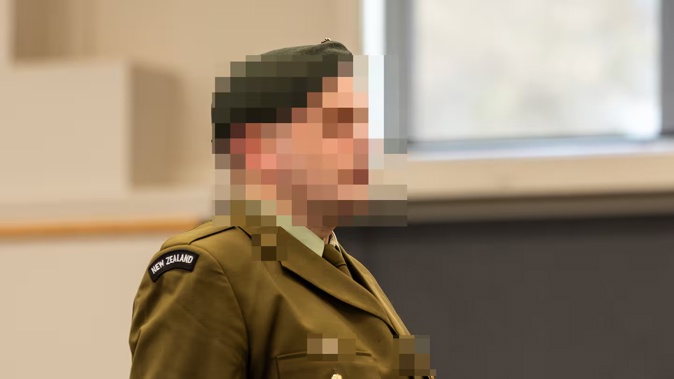

A New Zealand soldier with links to two right-wing groups who tried to defect and gave restricted military information to someone he thought was a foreign agent has been sentenced to two years in a military detention facility.
The man, whose name remains suppressed, admitted handing over bundles of New Zealand Defence Force (NZDF) documents to an undercover officer.
The officer had contacted the soldier, pretending to be a foreign agent, after the New Zealand Government became aware he had made contact with a third party, indicating he wanted to abandon his military allegiance.
Included in the information he handed over were maps and aerial photographs of various NZDF bases around the country, as well as passcodes, login details to its IT system, telephone directories and handwritten assessments of the vulnerabilities of the Linton Military Camp where he was stationed.
The soldier also offered to get a covert device into New Zealand Army headquarters.
Some of the information he’d found belonged to another soldier, while the bulk of it he’d taken from the NZDF’s internal computer system, and included restricted information.
Earlier this week, at a Court Martial held at Linton, the soldier pleaded guilty to a representative charge of attempted espionage, accessing a computer for a dishonest purpose and possession of a video of the Christchurch mosque shooting, as well as a copy of the shooter’s written manifesto, both of which were outlawed by the Classification Office.
It was a trial almost five years in the making, during which the soldier had been on open arrest since 2019 and suspended from his ordinary duties as a soldier. He was not allowed to wear a uniform or access any NZDF computer system, his passport was seized, but he remained on full pay.
The soldier’s sentence
Today, after more than a day of deliberation, Justice Kevin Riordan and a panel of three senior military members dismissed the soldier from the New Zealand Army and sentenced him to two years detention at the Burnham Military Camp.
Justice Riordan said there was no such thing as a non-serious attempt at espionage and that it was the first case of its kind in New Zealand history, so it was difficult to find a precedent.
The closest comparison the court found was of police employees who had sold information from the police database to criminals.
Justice Riordan said that the soldier had provided information to the undercover officer three times, and had an opportunity to stop each time and think about what he was doing.
“You could have stopped and said, ‘This is a breach of my trust in my country and my colleagues. I want to back out of this’,” Justice Riordan said.

The soldier pleaded guilty to charges of attempted espionage by attempting to sell military information to what he thought was a foreign agent. Pool Photo / Adele Rycroft, Manawatu Standard
While none of the material was classified higher than restricted, and much of it had no classification at all, the panel found that it still could have caused harm if it landed in the wrong hands.
The panel found that the most serious aspects of his offending were the attempt to provide passwords to the defence communications system, his identity card, access codes to two army bases, as well as multiple telephone directories.
Justice Riordan said the panel had taken into account the fact that no information had actually made it into the hands of a foreign power, and that it was not a sophisticated espionage plot.
“The court wonders how you could have been so naive.”
The panel said that it understood the soldier felt a level of desperation after coming under police scrutiny for his right-wing beliefs in the wake of the Christchurch mosque shootings, but that his offending wasn’t proportionate to this fear.
“As a response, it seems so truly disproportionate to the situation you found yourself in that it defies belief,” Justice Riordan said.
The panel was sceptical of the soldier’s expression of remorse, outlined in his affidavit to the court.
“You tell the court you love your country, but a person who loves their country does not provide material to its detriment to a foreign country,” Justice Riordan said.
“I think we can say you love a version of this country that is in your mind.”
The soldier was also found with a copy of the Christchurch mosque shooting livestream, the shooter’s manifesto, and the panel said that it would have dismissed him from service and sentenced him to detention on this charge alone.

The Court Martial was five years in the making after the soldier was first arrested in 2019. Photo / Jeremy Wilkinson
Justice Riordan said it spent the most time in its deliberations on whether to send the soldier to Burnham Military Camp detention centre, or to a civilian prison, but ultimately landed on the former.
The soldier originally faced 17 charges, including espionage, but they were replaced with charges of attempted espionage, accessing a computer system for dishonest purposes and possession of an objectionable publication, to which he pleaded guilty.
Espionage, commonly referred to as spying, is legally defined as the communication or delivery of information to another country with the intent to prejudice the security interests of New Zealand.
It’s the first military case of its kind in New Zealand, with the only similar case to date in the country’s history occurring about 50 years ago when William Sutch was tried and acquitted in a civilian court for supplying a Russian agent with information.
Jeremy Wilkinson is an Open Justice reporter based in Manawatū, covering courts and justice issues with an interest in tribunals. He has been a journalist for nearly a decade and has worked for NZME since 2022.

Take your Radio, Podcasts and Music with you









